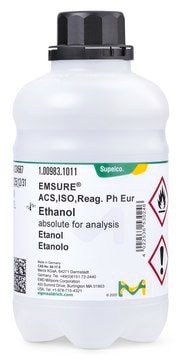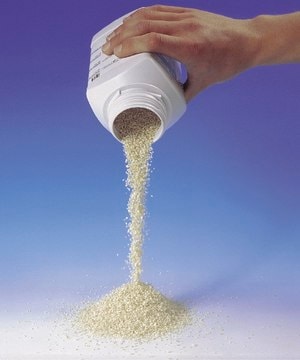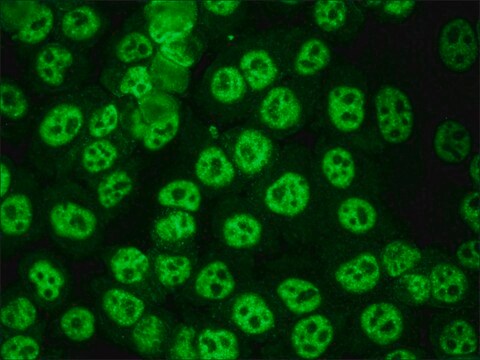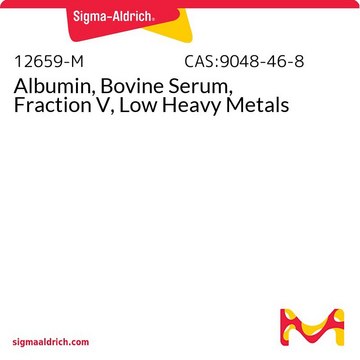1.12018
Albumin fraction V
(from bovine serum) for biochemistry
Synonim(y):
Albumin fraction V, Bovine serum albumin, Serum albumin
Zaloguj sięWyświetlanie cen organizacyjnych i kontraktowych
About This Item
Polecane produkty
Formularz
solid
pH
6.8-7.2 (20 °C, 1 g/L in H2O)
rozpuszczalność
1 g/L
gęstość nasypowa
150 kg/m3
temp. przechowywania
2-8°C
Opis ogólny
Bovine serum albumin (BSA) belongs to the serum albumin family with three domains and two sub-domains each. This globular, α-helical, non-glycosylated protein has 17-disulfide bonds.
Zastosowanie
Albumin fraction V has been used:
- as a component of perfusion buffer for perfusion protocol for rodent organ perfusion
- as a blocking agent in western blot analysis
- as a nitrated protein standard to study the effects of antibodies against 3-nitrotyrosine and to characterize the binding and detection of nitrated proteins in one-sided and sandwich immunoassays
Działania biochem./fizjol.
Bovine Serum Albumin (BSA) is the chief component of cell culture media and also works as a blocking agent in enzyme-linked immunosorbent assay (ELISA). It is beneficial for embryonic stem cells (hESC) differentiation and assists the transport of drugs, hormones, and fatty acids.
Komentarz do analizy
Appearance (colour): slightly yellow
Appearance (description): leafs
Assay of protein (spectralphotometric; calc. on anhydrous substance): ≥ 97.0 %
Assay of Albumin (Agarose gel electrophoresis): ≥ 98.0 %
pH-value (1 %; sodium chloride solution c = 0.5 mol/ l): 6.8 - 7.2
K (Potassium): ≤ 0.02 %
Na (Sodium): ≤ 0.5 %
Mg (Magnesium): ≤ 0.01 %
Ca (Calcium): ≤ 0.05 %
Heavy metals (as lead): ≤ 0.001 %
Fats: ≤ 0.2 %
Decomposition products: not detectable
Water (according to Karl Fischer): ≤ 5.00 %
Ash (600 °C): ≤ 1 %
NADH Oxidase (NADH; pH 7.5; 25° C): not detectable
LDH (pyruvate; pH 7.5; 25° C): not detectable
Appearance (description): leafs
Assay of protein (spectralphotometric; calc. on anhydrous substance): ≥ 97.0 %
Assay of Albumin (Agarose gel electrophoresis): ≥ 98.0 %
pH-value (1 %; sodium chloride solution c = 0.5 mol/ l): 6.8 - 7.2
K (Potassium): ≤ 0.02 %
Na (Sodium): ≤ 0.5 %
Mg (Magnesium): ≤ 0.01 %
Ca (Calcium): ≤ 0.05 %
Heavy metals (as lead): ≤ 0.001 %
Fats: ≤ 0.2 %
Decomposition products: not detectable
Water (according to Karl Fischer): ≤ 5.00 %
Ash (600 °C): ≤ 1 %
NADH Oxidase (NADH; pH 7.5; 25° C): not detectable
LDH (pyruvate; pH 7.5; 25° C): not detectable
Ta strona może zawierać tekst przetłumaczony maszynowo.
Kod klasy składowania
11 - Combustible Solids
Klasa zagrożenia wodnego (WGK)
WGK 3
Temperatura zapłonu (°F)
Not applicable
Temperatura zapłonu (°C)
Not applicable
Certyfikaty analizy (CoA)
Poszukaj Certyfikaty analizy (CoA), wpisując numer partii/serii produktów. Numery serii i partii można znaleźć na etykiecie produktu po słowach „seria” lub „partia”.
Masz już ten produkt?
Dokumenty związane z niedawno zakupionymi produktami zostały zamieszczone w Bibliotece dokumentów.
Klienci oglądali również te produkty
Sebastian Ivens et al.
Brain : a journal of neurology, 130(Pt 2), 535-547 (2006-11-24)
It has long been recognized that insults to the cerebral cortex, such as trauma, ischaemia or infections, may result in the development of epilepsy, one of the most common neurological disorders. Human and animal studies have suggested that perturbations in
Charlotte Bayer Christiansen et al.
American journal of physiology. Gastrointestinal and liver physiology, 315(1), G53-G65 (2018-03-02)
The colonic epithelium harbors a large number of endocrine cells, but little is known about the endocrine functions of the colon. However, the high density of glucagon like peptide-1 (GLP-1)- and peptide-YY (PYY)-secreting L cells is of great interest because
Kanika Singh et al.
Scientific reports, 10(1), 598-598 (2020-01-19)
Myocardial hypertrophy, an inflammatory condition of cardiac muscles is a maladaptive response of the heart to biomechanical stress, hemodynamic or neurohormonal stimuli. Previous studies indicated that knockout of Arginyltransferase (ATE1) gene in mice and embryos leads to contractile dysfunction, defective
Tamara Topală et al.
Clujul medical (1957), 87(4), 215-219 (2014-01-01)
The continuous search for new molecules with therapeutic abilities has led to the synthesis and characterization of a large number of metal complexes, proven to exhibit potential as pharmacological agents through their antibacterial, antiviral, antifungal and antineoplastic properties. As serum
Yuhong Xiao et al.
Journal of immunological methods, 384(1-2), 148-151 (2012-06-27)
The enzyme-linked immunosorbent assay (ELISA) is an extremely common and powerful laboratory technique for detecting proteins by antibodies. Researchers frequently use bovine serum albumin (BSA) as a blocking agent to prevent non-specific binding of antigens and antibodies to the microtiter
Nasz zespół naukowców ma doświadczenie we wszystkich obszarach badań, w tym w naukach przyrodniczych, materiałoznawstwie, syntezie chemicznej, chromatografii, analityce i wielu innych dziedzinach.
Skontaktuj się z zespołem ds. pomocy technicznej











